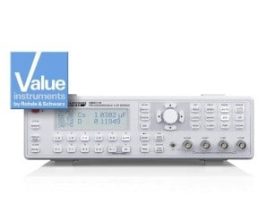Power Electronics Test Systems /
Passive Component Test Solutions
Passive components, such as resistors, capacitors, and inductors, are fundamental building blocks of electronic circuits. As the complexity and performance demands of electronic systems increase, the need for accurate and efficient testing of passive components becomes increasingly important. Passive component test solutions refer to the range of tools and techniques used to measure the electrical properties of passive components and ensure they meet their specified requirements.
There are various passive component test solutions available, ranging from simple handheld multimeters to sophisticated automated test equipment (ATE) systems. The choice of solution depends on the requirements of the specific application, such as the type of component, the required accuracy and speed, and the volume of components to be tested.
One common method for testing passive components is using LCR meters, which measure the inductance, capacitance, and resistance of the component under test. LCR meters can be used to test a wide range of passive components, including surface mount and through-hole components, and are capable of measuring at high frequencies.
Other passive component test solutions include impedance analyzers, which are more specialized instruments for measuring complex impedance and phase angle of components, and curve tracers, which allow for visualizing the response of components to varying inputs. ATE systems are used for high-volume production testing of passive components, often with automated handling and testing capabilities.
Passive components, such as resistors, capacitors, and inductors, are fundamental building blocks of electronic circuits. As the complexity and performance demands of electronic systems increase, the need for accurate and…
...efficient testing of passive components becomes increasingly important. Passive component test solutions refer to the range of tools and techniques used to measure the electrical properties of passive components and ensure they meet their specified requirements.
There are various passive component test solutions available, ranging from simple handheld multimeters to sophisticated automated test equipment (ATE) systems. The choice of solution depends on the requirements of the specific application, such as the type of component, the required accuracy and speed, and the volume of components to be tested.
One common method for testing passive components is using LCR meters, which measure the inductance, capacitance, and resistance of the component under test. LCR meters can be used to test a wide range of passive components, including surface mount and through-hole components, and are capable of measuring at high frequencies.
Other passive component test solutions include impedance analyzers, which are more specialized instruments for measuring complex impedance and phase angle of components, and curve tracers, which allow for visualizing the response of components to varying inputs. ATE systems are used for high-volume production testing of passive components, often with automated handling and testing capabilities.
-
These HM8118 200kHz LCR Bridge meter instruments are high performance precision measuring...FIND OUT MORE

